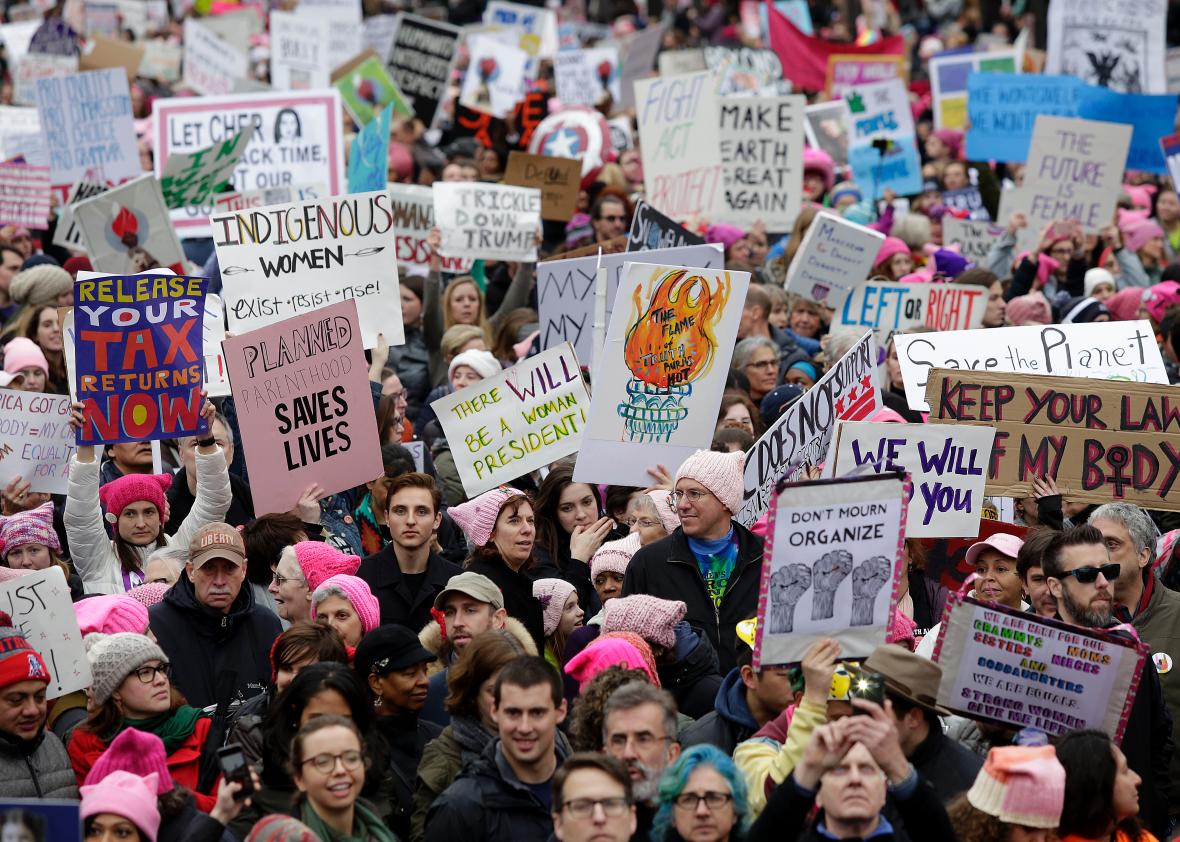Posted on January 30, 2017

There have been a few technical problems with the site that I’ve had to work out. Those should be taken care of before the end of the week – I feel like I have missed so many things to talk about. Let’s start with the women’s march last week.
This is a fascinating topic, and people have asked me many questions about it this week. Of course, as with everything else these past 9 days, people are freaking out about everything. I took the time to interview four women that I know that participated in the Women’s March to get the most honest idea of why they were marching and exactly what they were concerned about. And just for full disclosure – the group consisted of a teacher, an adjunct professor, a legal assistant, and a server. Here is their main list of concerns. (please keep in mind these concerns were common to all four interviewees)
- Pro Choice / Pro Birth-control
- Responses ranged from “women should have the right to choose when to have a baby” and “any regulation of birth control is sexist and discriminatory towards women.”
- LGBTQ Rights (marriage should be between 2 people not a JUST a man and woman)
- Presidential Cabinet “selections” of EPA, Sec. Education, Sec. State.
- General “loss of rights because of conservative senate”
- Equal pay for equal work
Let’s go point by point and address these things.
First, the pro choice / pro birth control argument. I’m not sure if the women who marched for this cause are aware of these things and in no way do I mean this sarcastically … but birth control in and of itself is a commodity that can be purchased — it’s a thing. It’s not a right. Its necessity is not enumerated in the constitution and it’s something that one should be required to pay for IF one wants to use it. No one is forcing people to use it – just like no one is forcing anyone to have sex.
The pro choice argument is a different one altogether. There was a court case in 1973 called Roe v Wade. In it, the supreme court of the United States decided (7-2) that a woman’s right to an abortion was covered in the constitution under the “right to privacy.” It’s important here to remember what is required in government to overturn a court decision — either an amendment to the constitution (which requires 2/3 vote of both house and senate with 3/4 of the state legislatures also approving) or the supreme court overturning the previous decision of itself. Both of these things are certainly unlikely circumstances. This would basically mean that an overwhelming majority of the nation would have to support a complete ban on abortion or the supreme court would have to be overwhelmingly conservative (remember roe v wade was 7-2 PRO abortion rights). It would be a slow and predictable process — not one that would happen overnight.
Of the people in the United States (CNN POLL) 58% of people oppose all or almost all abortions. Let that number sink in. Among the rest of respondents, only 26% think abortion should be legal in all circumstances. That leaves another 16% in the middle. And this is CNN’s poll … I say this to paint the picture of America that actually exists – not the one that the left wants you to think exists. I am not going to go into my personal view on abortion here (as I will in a separate post)but will stay on topic.
As far as women choosing when to have a baby — in any case of pregnancy (excluding rape and endangerment of the mother’s life) women are in complete control of when to have a baby. Consensual sex is the mechanism through which that happens … no one is forcing anyone to have sex. If they do — that’s a crime. In the cases of rape, incest, or endangerment of the life of the mother anyone with a sound mind would grant rights of the pregnancy to the mother alone.
Second, the pro LGBTQ rights group. I’m not sure how the LGBTQ rights got lumped in with women’s rights but, regardless, let’s address this. Gay marriage, again, was a decision of the United States supreme court — meaning that a similar process that is discussed above would have to occur to overturn this decision. (For an interesting insight as to why this decision was harmful please see HERE.) Also, as an aside, many people give the president credit for this type of court decision – the only way the president affects these things is through nominating supreme court justices. This points back to the notion that the president AND the senate are involved with selecting justices … which means the American people are influencing this process directly. Here is the kicker — if you remember watching Trump’s speech at the RNC he actually championed gay rights and indicated he’s a supporter of the LGBTQ community. I strongly doubt he would nominate a supreme court justice that would help overturn the court’s decision in that area. It would also be unpopular with 61% of Americans for gay marriage. SOURCE

Image Credit: Reuters
Third, presidential cabinet “selections”. I use quotations there because all of the women that I spoke with referred to the cabinet NOMINEES as “selections” or “appointees”. It is important to make the distinction because this type of language indicates a misunderstanding of the constitutional role of the president. He (or she) nominates people and the senate must approve of them with a vote. I say that because it is important to remember that, even after a presidential election, our principles of checks and balances is still working. The president is not a dictator and limits on his power are built into our country. If you are concerned with the nominees themselves, I can understand that – I’m just writing here to point out that’s not about women’s rights. Moreover – two of the four women described concern over Betsy Devos for department of education … last I checked she’s a woman …. and a billionaire. So it can’t be just about women’s rights here. That, however, doesn’t mean she’s not to be criticized.
Fourth, three of the four women interviewed referred to loss of rights because both the congress and president were all conservative. This is actually the most informing of all the given reasons for this march … why? Because it’s not actually pro anything — it’s against the party in power. Given the reasons listed above, it doesn’t really seem like the march was for women’s rights so much as it was against the party in power. And I’m not saying that’s wrong at all … but let’s just call it what it is. So let’s also cover that really quickly.
Fifth, Equal pay for equal work. This has been a myth that has been debunked by many studies. And this statement still doesn’t seem to sway some people. Please hear me out. There are many sets of data that suggest that women in general do not get paid what men get paid. Please think deeper into this and do not stop there. First, it is illegal for business to discriminate based on sex already. Secondly, the data referenced by those perpetuating the pay gap myth does not account for job tenure, occupation type, hours worked, or experience. This is why it has been proven that women that graduate from college with no difference in experience than men actually get paid slightly more, on average, than their male counterparts. (sources available HERE) Additionally, single women in large cities actually get paid more than men (SOURCE). Lastly, please recognize that, based on raw principles of economics, if businesses were really getting away with paying women 20% less money than men for the same work — don’t you think businesses would really only hire women? Why spend the extra 20% on men if you can get the same out of women? The answer is they don’t because no real pay gap exists. (SOURCE) If you don’t want to take the time to read the data — see the Prager University video below.
US citizens have a right (and duty) to advocate for what they believe in. If that advocation is protest, so be it. But let’s take note of who the major organizers of the protest were.
- 1) George Soros (leftist globalist billionaire)
- 2) Linda Sarsour (leftist anti-Semitic leader who is pro sharia law)
- 3) Planned Parenthood
- 4) Tamika Mallory (co founder of Al Sharpton’s national action network)
- 5) Carmen Perez (NYC Justice League and NAACP award recipient)
If this list of organizers doesn’t clue you into the underpinnings of this protest I don’t know what will. My overall point in writing this is to get you to see that this march was simply not about women and if there is any concern about policy changes, it is exaggerated because it is very unlikely to change in the near future. …. and if any policies did change …. they would be subject to the oversight of the US supreme court (which has already indicated its positions) and, most importantly, the American people. We are in no different place than we were before.
I am also writing this in hopes of reaching you who did support this march either knowingly or not … Do not allow the people pushing this agenda on you to stop you from achieving the life you want to live. People on the left are always telling you what you can’t do and who is supposedly stopping you from doing it. It is disempowering you from controlling your own life. There are no barriers stopping you from taking control of your life. Don’t fall into the trap of blaming other people for your problems … if you have a problem and blame it on someone else you’re taking away the power you already have to fix it — and believe me … you can do anything you set your mind to. Just like men can. — that’s equality. That’s America.


Recent Comments